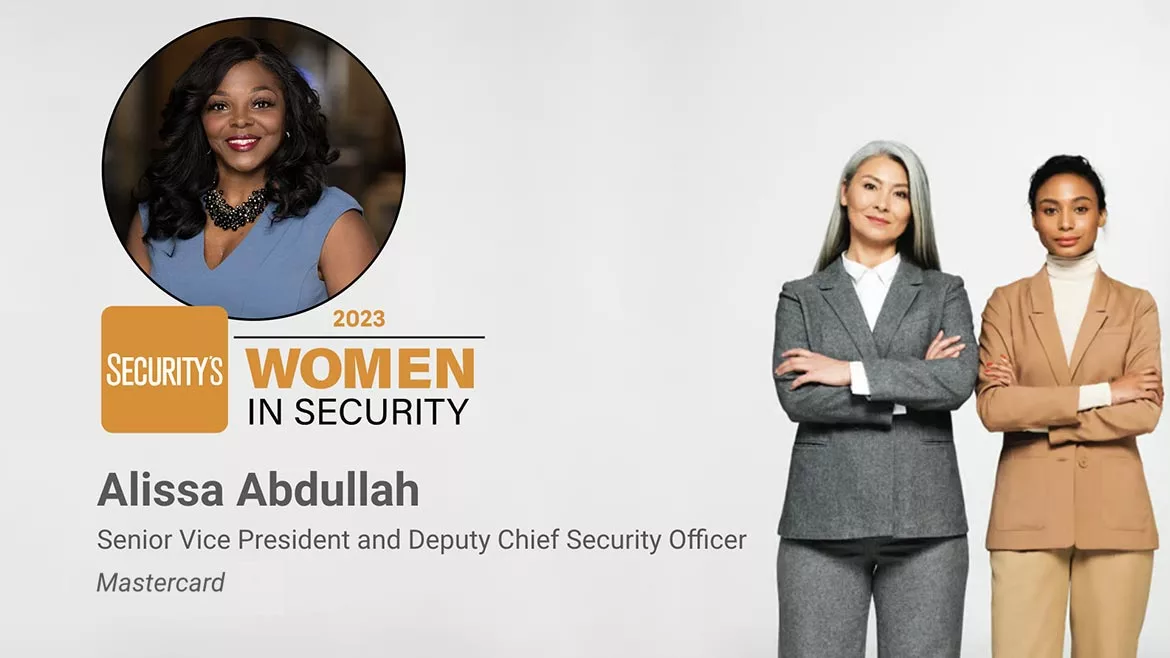Special Report: Women in Security 2023
Alissa Abdullah | Women in Security 2023
Senior Vice President and Deputy Chief Security Officer, Mastercard

Background image / LightFieldStudios / iStock / Getty Images Plus / via Getty Images
Bio image courtesy of Abdullah
Dr. Alissa “Dr. Jay” Abdullah, Senior Vice President and Deputy Chief Security Officer at Mastercard, has emphasized creativity and technical skills throughout her career, starting with her job as a radio DJ throughout her college years. She received her Bachelor of Science in math from Savannah State University before going on to gain her Master’s in telecommunication and computer networks. Dr. Jay then received her Doctorate in information technology management in 2006.
When considering post-baccalaureate opportunities, Dr. Jay says, “One of my [undergraduate] English professors came to me and said, ‘You’re no mass communications major.’ And my math professor came to me — I think they kind of teamed up — and said, ‘I think you should be a mathematician. I think you have a unique gift, and you should be a mathematician.’”
Dr. Jay had little interest in math as a career and no interest in teaching at the time — though she loves teaching now — so her professor suggested a career in technology and the National Security Agency. Dr. Jay worked as a cryptologic engineer for the Department of Defense during the end of her undergraduate career and following graduation. After receiving her doctorate, Dr. Jay became the Deputy Chief Technology Officer at defense company Lockheed Martin. For more than a decade, Dr. Jay warmed to teaching and served as an Adjunct Professor of statistics, algebra, information technology and leadership at the University of Maryland, American Public University, South University, University of Phoenix, American Sentinel University, Kaplan University and College of Southern Maryland.
Dr. Jay moved into cybersecurity during her time at the White House. She was the Deputy Chief Information Officer at the White House from 2012 to 2015 and was responsible for internal White House technology for Camp David and Air Force One.
“The President serves as the President of the American people and the role of Commander in Chief for the Armed Forces: two different roles and two different hats,” Dr. Jay says, describing her role. “I served the President of American citizens. That included making sure all of his technology was to his liking, advanced and secure. That was for the White House, Camp David and the Air Force.”
Serving during the Obama Administration, Dr. Jay worked at the White House as the world saw a surge in new technology. For example, President Obama was the first U.S. President to have a Presidential social media account, meaning there were entirely new channels for security leaders to manage threats. Dr. Jay focused on not only current threats but future threats as well, needing to plan for technology’s quick evolution.
This position launched Dr. Jay more fully into cybersecurity, leading to a CISO role at Xerox before ending up in her current position at Mastercard. Dr. Jay took that experience into her role as Mastercard’s Senior Vice President and Deputy Chief Security Officer, where she leads cybersecurity in Mastercard’s international markets. She works to protect the company from new and future threats, including helping the company shift to a zero trust framework. When addressing threats to the financial sector, Dr. Jay talks about how different sectors face the same threats — it’s how they manifest that makes the difference.
“The adversary is going to try to attack through spearphishing a healthcare provider or healthcare company very differently from a financial services company. But the threat is still the same,” Dr. Jay says.
A phishing campaign has to be specific to be successful, so threat actors will tailor messages depending on the sector they are targeting. To mitigate those threats, Dr. Jay talks about educating teams through phishing simulations and threat awareness.
Dr. Jay also works closely with Mastercard’s partnerships with historically Black colleges and universities (HBCUs). Dr. Jay describes HBCUs as “centers of excellence”, having attended Savannah State University herself. The encouragement and exposure Dr. Jay received in school is the entire reason she entered the security field, she says, and she wants to ensure future generations receive that exposure.
Mastercard’s partnerships include grants, internships and job opportunities designed to target the racial wealth and opportunity gap. Dr. Jay has also held discussions around cybersecurity in the Black community at the White House, leading conversations in how to expose underrepresented communities to cybersecurity careers.
When asked what advice she’d give to women entering the field, Dr. Jay says, “There is something in cybersecurity for everyone.” Dr. Jay emphasizes how various talents can apply to the field, and her work regarding racial and gender bias and the intersection between them is designed to challenge the idea that only a certain kind of person can work in cybersecurity. Artistic skills, such as Dr. Jay’s DJ experience or her ability to play the violin, don’t automatically disqualify someone from a more scientific field. Dr. Jay believes her creativity makes her better at her job, allowing her to think outside the box to solve a problem.
Dr. Jay emphasizes how there is a place for any particular skillset and encourages women to try new fields. On the leadership side, she encourages security leaders to make their jobs known to anyone and everyone. Furthermore, Dr. Jay says that security leaders need to spend time explaining what different career paths there are in security. Many people don’t know what security careers are or assume they’re all computer science or engineering-based.
“Careers in cybersecurity are not broadcasted. Those are the things that happen in the background that we have to tell students about, that we have to tell young kids about, that we have to tell girls about and make it something they understand,” says Dr. Jay.
When reflecting back on her career, Dr. Jay says she’s most proud of the leader she has become.
“I am from a very small town in a community that sometimes isn’t exposed to many different opportunities,” she says. “I’ve been able to work in various sectors and all levels of government and have been recognized and awarded. I would have to say, I am most proud of that level of recognition. It is an honor to be in this position, and I don’t take it lightly.”
Looking for a reprint of this article?
From high-res PDFs to custom plaques, order your copy today!







